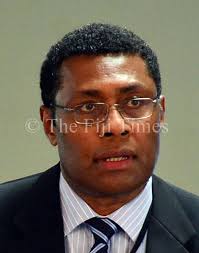MINISTRY of Health and Medical Services permanent secretary Dr Jemesa Tudravu lauded the dedication of healthcare workers operating in often challenging and remote environments.
While delivering his opening address during the Pacific Paediatric Association 2025 Conference in Nadi last week, Dr Tudravu acknowledged the strides made in reducing child mortality and expanding vital immunisation programs.
He also highlighted a concerning trend: progress in child health across the Pacific’s small island states continues to lag global advancements.
“Mirroring global trends, the leading causes of mortality among children under five in the Pacific region are infections, predominantly pneumonia, and neonatal conditions including prematurity and birth related complications,” he said.
Dr Tudravu says the tragic reality is that many of these deaths are preventable through simple, evidence-based interventions.
“The health and wellbeing of our children is importantly impacted by under- and over-nutrition, access to quality care, and the environment,” he said.
“This is compounded by the challenges of geographic isolation, squeezed low- and middle-income country economies and power imbalances with global geopolitical actors.”
He said the significant influence of under- and over-nutrition were unequal access to quality healthcare, and the pervasive impacts of environmental factors.
“Children with developmental delays or disabilities are under-identified, undiagnosed and have minimal or delayed access to quality support and interventions, and a lack of services that focus on adolescent health and child/adolescent mental health needs.
“Our focus must expand beyond survival to include development, inclusion, and well-being. We face rising demands to address: neurodevelopmental conditions, child protection and appropriate adolescent care, The growing burden of non-communicable diseases in children.”
Dr Tudravu also highlighted the lack of support for children with developmental delays or disabilities and the scarcity of services tailored to adolescent health and the growing need for child and adolescent mental health support.
“This spirit of collaboration defines our region and this conference. Our vision for our children’s future must be bold and inclusive, and the sessions in this conference highlight and address this vision. The Fijian expression, ‘Na Bula Sautu’ captures this vision well.
“It means more than ‘good health’, it encapsulates an abundant life, life lived to its fullest potential; that each child reaches and enjoys their fullest potential. To achieve this, we must place child health and wellbeing at the top of national and regional health agendas.
“Prioritise policy which promotes child health, inclusion, and wellbeing, increase investment in child health by establishing and consolidating early childhood development services.
“Ensuring access to early inclusive education and healthcare for children with disabilities, prioritising access to mental health and psychosocial support. Building and retaining a skilled and supported Pacific child health workforce and including children in our climate change and disaster preparedness planning.”



